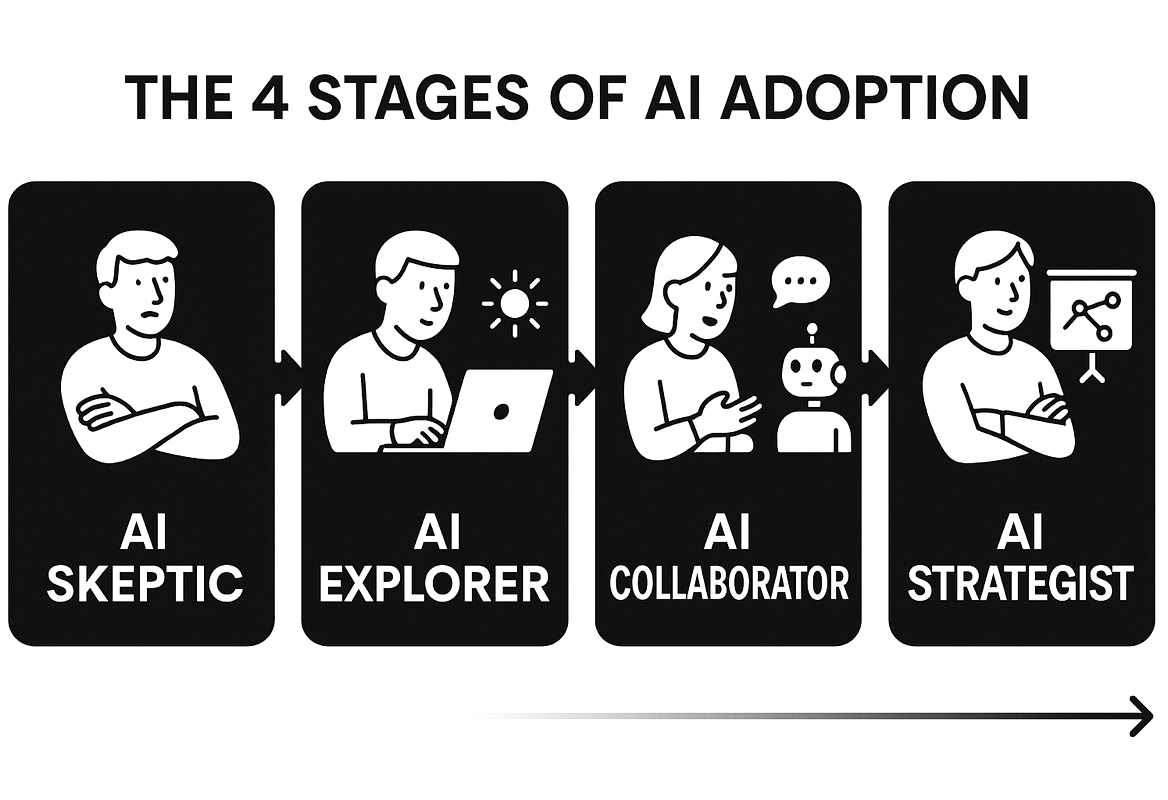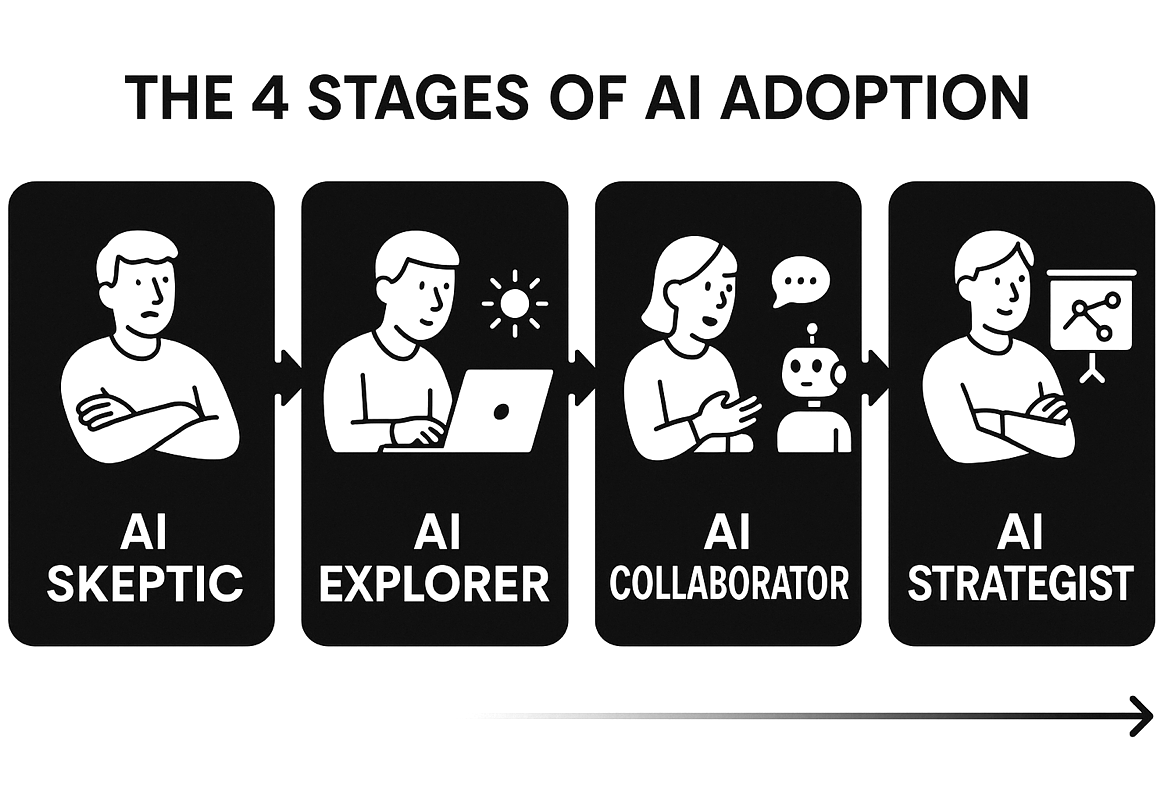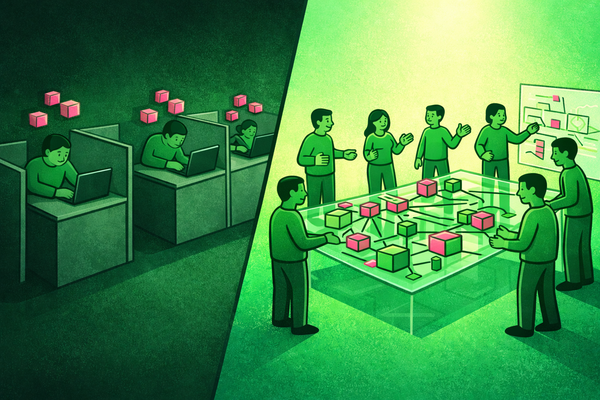[One More Thing] The AI Adoption Curve: What Developers Can Teach the Rest of Us
The 4-stage journey from skeptic to strategist (and skills needed to accelerate through them)

It's no surprise that technical roles have been the first to be significantly impacted by AI. Models excel at coding, and effective tools have been introduced that augment day-to-day processes for developers.
Google recently stated that AI now assists with 50% of its code characters.
In many cases, if developers are not using AI, they're limiting themselves vs competitors who are.
So, what can those of us in fields that are slower to be impacted learn from devs?
A survey done by Thomas Dohmke and Eirini Kalliamvakou on GitHub of 22 developers who use AI heavily in their work gives us a preview of what is coming for the rest of us.
The 4 Stages of AI Adoption
The survey identified 4 stages people go through on their way to becoming heavy AI users. Here's an adapted version for us non-technical employees.
If you've ever struggled to implement or adopt a new tool at work, this pattern will feel familiar.

Stage 1: AI Skeptic
- Dabbling with AI for small tasks and questions
- "AI is pretty cool, but gimmicky"
- Low tolerance for inconsistency
- Lack of immediate value leads people to check out or remain skeptical
Skill needed to get to next stage = TOLERANCE
Expect that AI will be inconsistent. It's excellent at some things and awful at others. The key is not writing it off too soon.
Stage 2: AI Explorer
- Uses AI for basic tasks in their domain
- Starts to see value based on tool experimentation
- Begins to understand AI's strengths and limitations
- Learning AI fundamentals that advance skills
Skill needed to get to next stage = PERSISTANCE
In order to effectively use AI, you need to learn how to work with it. How you do this is by putting in reps to see what works and doesn't.
Stage 3: AI Collaborator
- Co-creating with AI on multi-step tasks
- Knows how to improve outputs and where to use AI
- Gives clear instructions and is working systematically
- Not overreliant on AI
Skill needed to get to next stage = PRAGMATISM
You'll notice how small tweaks have big impacts on the output. Creating strong processes is dependant on refining inputs and testing tools.
Stage 4: AI Strategist
- AI is their strategic partner for complex work
- Understands AI capabilities and creates workflows that increase ambition
- Confident about AI's role in their future and is teaching others
- Their role has evolved because of AI, not diminished
Skills Mastered = SYSTEMS THINKING
At this point, you're able to zoom in and out. You understand AI's capabilities, know where it should impact workflows, and can connect it to bigger outcomes.
More Signs of What's Coming
- Roles Will Shift: Heavy AI users in Stage 4 say their job has changed. They now focus more on delegating tasks to AI and overseeing its outputs.
- Personal Value is Reinvented: Devs said that they would embrace AI writing 90% of code in the future. They felt that their value or identity wouldn't diminish. Experiencing the level of skill and effort that goes into strategic AI use led them to feel optimistic about their roles in the process.
- Amplifier Not Replacement: Devs rarely mentioned how AI saved them time; instead, they talked about increasing their ambition. Instead of strategizing how to reduce effort, they shifted towards expanding their scope.
- New Skills Become Critical: AI fluency and fundamentals, delegation and orchestration, human-AI collaboration, verification and quality control, product understanding, and architecture and systems design all become increasingly important for Devs - and also for non-technical users who want to effectively lead with AI.
- Training Must Catch Up: Ignoring AI will leave students and employees unprepared. Education and training need to embrace real-world tools in order to effectively aid people in AI use and further their potential.
Looking Ahead
The adoption pattern is clear. Developers got there first, but the rest of us will cycle through the 4 stages too.
Where are you and your team right now?
It's normal to be at Stage 1 or 2, but you should be thinking of how you can get to Stage 3 and 4 quickly. While we've yet to see sizable impacts of AI on market outcomes, it's only a matter of time until it's felt. The competitive advantage will go to those who reach the advanced stages while others remain skeptical.
What can you learn from the above?
Knowing the stages allows you to work against elements of friction that could hold you or your team back. Start building your tolerance, put in the reps, and focus on systematic progress.





